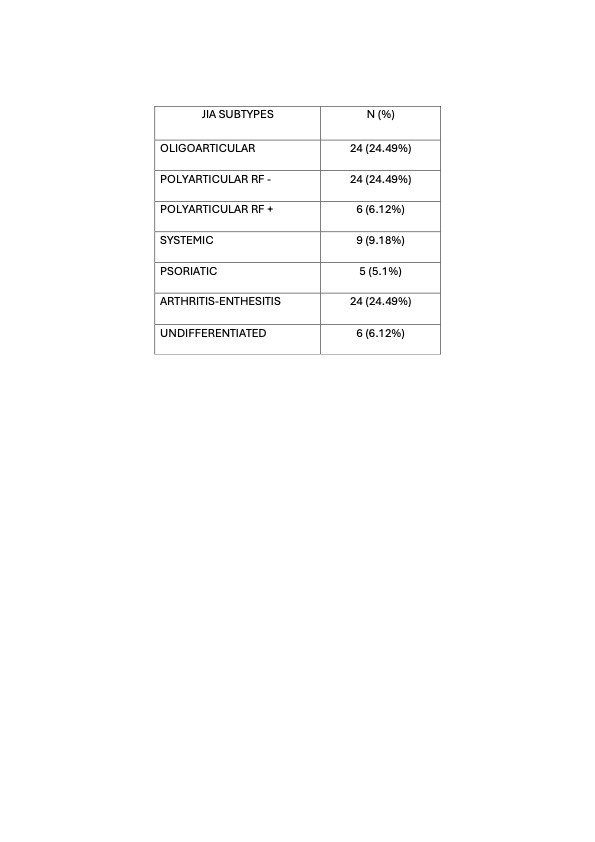Session Information
Session Type: Poster Session B
Session Time: 10:30AM-12:30PM
Background/Purpose: Juvenile idiopathic arthritis is the most common group of inflammatory rheumatic diseases in childhood. Its early onset and the immunosuppressive treatments used to control it may interfere with adherence to the established immunisation schedule and increase the risk of infections in adulthood. Little information is available on the magnitude of this problem in clinical practice.The aim of this study is to assess the degree of compliance with the Spanish vaccination calendar prior to the rheumatology transitional consultation and to analyse different factors that may influence its implementation.
Methods: A single-centre observational retrospective study of patients with JIA (ILAR 2001) included in the rheumatology transitional consultation register (2012-2024) has been performed. Clinical, therapeutic and vaccination data were collected. Given the variability of the vaccination schedule throughout the follow-up period, it was agreed to include vaccines for HBV, Polyomavirus, Haemophilus influenzae B, Diphtheria-Tetanus-Polio (DTaP), Pneumococcal (13-valent), Men. C, Papilloma, Varicella and MMR. The main variables included were: treatment with biological DMARDs or classical DMARDs, years of exposure to biological DMARDs, age at diagnosis and date at the time of transition consultation.Exposure to the vaccine was considered as having received at least one dose of the vaccine and full vaccination with receiving the doses established in the vaccination schedule of the Valencian Community (Spain)Logistic regression models were used to study the relationship between the different variables and vaccination compliance.
Results: 98 patients (64.29% female) with a mean age (SD) of 8.65 (4.73) years old at diagnosis and 20.41 (2.54) years old at the rheumatology transition consultation visit, were included. The distribution by JIA subtypes are described in table 1. 53.61% of patients had been treated with biological DMARDs with an average duration of treatment of 18.47 years and 52.04% had been treated with classical DMARDs. Only 2 patients received the full dose of all the established vaccines and 5 received at least one dose. Table 2 shows the percentage of compliance for each vaccine. Multivariate analysis showed that biological DMARD treatment was associated with lower complete vaccination for MMR (p=0.004), Polyomavuris (p=0.01), H.influenzae B (p=0.02), Men. C (p=0.017), Papilloma (p=0.01) and DTaP (p=0.004). On the other hand, treatment with classical DMARDs was associated with higher exposure to pneumococcal (p=0.004) and HBV (p=0.03) vaccination. A more recent date at the transition consultation was related to higher percentage of complete vaccination for DtaP (p=0.003), Polyomavuris (p=0.03), Haemophilus Influenzae B (p< 0.001), pneumococcal (p=0.001), Men. C (p=0.034) and Varicella (p=0.001) vaccines.
Conclusion: A low percentage of vaccination exposure and especially a low percentage of complete vaccination was observed for both live and inactivated virus vaccines, mainly related to the biological DMARD prescription. In contrast, treatment with classical DMARDs was associated with higher exposure to pneumococcal and HBV vaccines. Compliance was higher in recent years.
.jpg) Vaccination compliance in JIA patients
Vaccination compliance in JIA patients
To cite this abstract in AMA style:
Perez Hurtado A, Ivorra Cortes J, GRAU GARCIA E, Simeo Vinaixa M, Alcantara Alvarez I, Villanueva Manes B, Torrat Noves A, Ramos Castro D, Muñoz Martinez P, mas sanchez L, López Montesinos B, Lacruz Pérez L, Andrés Román Ivorra J. Analysis of Vaccination Compliance In Patients With Juvenile Idiopathic Arthritis At The Rheumatology Transitional Consultation [abstract]. Arthritis Rheumatol. 2025; 77 (suppl 9). https://acrabstracts.org/abstract/analysis-of-vaccination-compliance-in-patients-with-juvenile-idiopathic-arthritis-at-the-rheumatology-transitional-consultation/. Accessed .« Back to ACR Convergence 2025
ACR Meeting Abstracts - https://acrabstracts.org/abstract/analysis-of-vaccination-compliance-in-patients-with-juvenile-idiopathic-arthritis-at-the-rheumatology-transitional-consultation/

